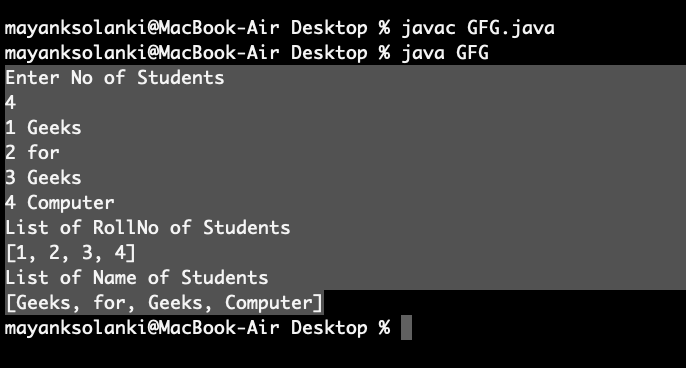Java映射到列表的转换
Map 是将键映射到值的对象,或者是属性-值对的集合。列表是对象的有序集合,并且列表可以包含重复值。 Map 有两个值(键和值),而 List 只有一个值(元素)。所以我们可以生成两个列表:
- 值列表和
- 地图中的键列表。
让我们假设“ map”是 Map 的实例,此后我们都知道它包含集合和值对。所以它们定义如下:
- map.values()将返回地图值的集合。
- map.keySet()将返回一组地图的键。
方法:
- 在 ArrayList 构造函数参数中传递键集
- 将 map.values() 方法生成的地图值集合传递给 ArrayList 构造函数参数
- 使用 Streams API(仅适用于 JDK 8 及更高版本)
让我们讨论它们中的每一个
方法 1:在 ArrayList 构造函数参数中传递键集
过程:我们可以绕过map.keySet()方法生成的映射键集合到ArrayList构造函数参数,将映射键转换为键列表,如下所示
map.values(); // Now here e will pass sets of keys of our map, so it becomes
map.values(map.keySet()); // Now we just need to store it into List, so creating object
List ListofKeys = new ArrayList(map.keySet()); // Now we are done with conversion. 语法:此后如下:
List ListofKeys = new ArrayList(map.keySet());方法二: ListListofKeys = new ArrayList(map.keySet());
我们可以通过将map.values() 方法生成的映射值集合传递给 ArrayList 构造函数参数,将映射键转换为值列表。
语法:此后如下:
List Listofvalues = new ArrayList(map.values());例子
Java
// Java Program to Convert Map to List
// Importing required classes
import java.util.*;
class GFG {
// Method 1
public static void main(String[] args)
{
// Creating HashMap
HashMap hs = new HashMap<>();
// Adding elements to hashMap
hs.put("Geeks", 1);
hs.put("for", 2);
hs.put("Geeks", 3);
hs.put("Computer", 4);
hs.put("Science", 5);
hs.put("Portal", 6);
// Calling method
MapValuesToList obj = new MapValuesToList(hs);
// Storing into List
List mapvaltolist = obj.mapvaltolist(hs);
// Printing via for loops
for (Integer integerList : mapvaltolist) {
// Printing our ArrayList
System.out.println(integerList);
}
}
// Method 2
// To convert Map to List
public List
mapvaltolist(Map map)
{
// Using Collection
Collection val = map.values();
// Creating an ArrayList
ArrayList al = new ArrayList<>(values);
return al;
}
} Java
// Java program to Convert Map to List
// Importing required classes
import java.util.*;
// Importing stream sub-package
import java.util.stream.*;
// Main class
// MapToList
class GFG {
// Main driver method
public static void main(String[] args)
{
// Scanner class to take input of key-value pairs
Scanner sc = new Scanner(System.in);
// Creating a Hashmap which maps rollno with student
// name
Map map
= new HashMap();
// Command for better usability
System.out.println("Enter No of Students");
// Taking input to Hashmap
// via iterating using for loop
int noOfStudents = Integer.parseInt(sc.nextLine());
for (int i = 0; i < noOfStudents; i++) {
String input = sc.nextLine();
String[] studentdata = input.split(" ");
String rollno = studentdata[0];
String name = studentdata[1];
// Simply inserting received pairs to Map
map.put(rollno, name);
}
// Now first create list of keys and values
List ListofKeys = null;
List ListofValues = null;
// Now converting hashMap to List of keys and values
ListofKeys = map.keySet().stream().collect(
Collectors.toCollection(ArrayList::new));
ListofValues = map.values().stream().collect(
Collectors.toCollection(ArrayList::new));
// lastly printing List of rollno and name of
// students
System.out.println("List of RollNo of Students");
System.out.println(ListofKeys.toString());
System.out.println("List of Name of Students");
System.out.println(ListofValues.toString());
}
} 输出:
1
2
3
4
5
6方法 3:使用 Streams API
stream() 方法从 Map.keySet() 返回的映射键集合中返回键流。 Stream 类的 collect() 方法收集 List 中的键流。将 Collectors.toCollection(ArrayList::new) 传递给 collect() 方法以收集为新的 ArrayList。还可以使用 Stream API 将映射键和值转换为相应的列表。语法如下所示:
List ListofKeys = map.keyset().stream().collect(Collectors.toCollection(ArrayList::new));List Listofvalues= map.values().stream().collect(Collectors.toCollection(ArrayList::new));Note: You can collect elements of Stream in an ArrayList, LinkedList, or any other List implementation.
执行:
给定 RollNo 和 N 个学生的学生姓名作为输入。首先,我们创建一个 Map,其中 Rollno 是键,因为 Rollno 是唯一的,并且 Name 作为 Map 的值,然后将此映射分别转换为值和键的列表。其中,生成的键列表包含学生的 RollNo,值的列表包含学生的姓名。
例子
Java
// Java program to Convert Map to List
// Importing required classes
import java.util.*;
// Importing stream sub-package
import java.util.stream.*;
// Main class
// MapToList
class GFG {
// Main driver method
public static void main(String[] args)
{
// Scanner class to take input of key-value pairs
Scanner sc = new Scanner(System.in);
// Creating a Hashmap which maps rollno with student
// name
Map map
= new HashMap();
// Command for better usability
System.out.println("Enter No of Students");
// Taking input to Hashmap
// via iterating using for loop
int noOfStudents = Integer.parseInt(sc.nextLine());
for (int i = 0; i < noOfStudents; i++) {
String input = sc.nextLine();
String[] studentdata = input.split(" ");
String rollno = studentdata[0];
String name = studentdata[1];
// Simply inserting received pairs to Map
map.put(rollno, name);
}
// Now first create list of keys and values
List ListofKeys = null;
List ListofValues = null;
// Now converting hashMap to List of keys and values
ListofKeys = map.keySet().stream().collect(
Collectors.toCollection(ArrayList::new));
ListofValues = map.values().stream().collect(
Collectors.toCollection(ArrayList::new));
// lastly printing List of rollno and name of
// students
System.out.println("List of RollNo of Students");
System.out.println(ListofKeys.toString());
System.out.println("List of Name of Students");
System.out.println(ListofValues.toString());
}
}
输出:
